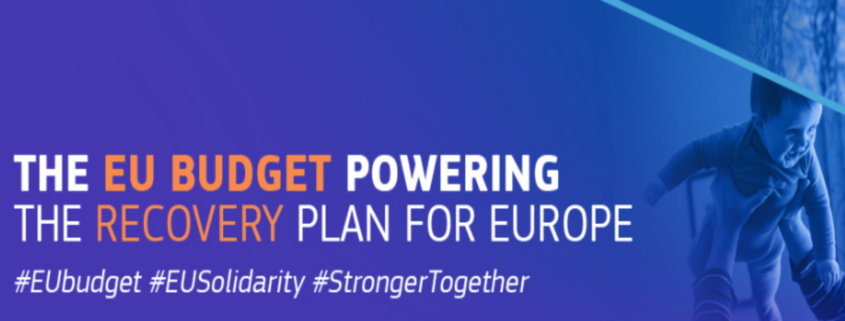Governing the economic change

A challenge from the Recovery Plan for Europe
The corona virus outbreak has provoked the most dramatic global humanitarian crisis in living memory. It forced a deep change in our way of living, keeping us apart from our friends and families and, most sadly, the casualties due to it keep climbing all over the world.
At the same time, the pandemic has triggered the most drastic world economic crisis of the last century. In response, central banks and governments have unleashed a series of unprecedented stimulus-packages to fight the downturn. Such measures are absolutely needed. Firstly, they provide vital support to workers, consumers and businesses, helping them to go through the emergency. And secondly, they are necessary to limit the economic scars, the lasting economic damages that persist even after the emergency-phase has finished and that limit the subsequent recovery.
But simultaneously, it is crucial to stay focused on the medium-term objective: the transition to a green and digital economy. In fighting the short-term damage caused by the pandemic, most governments have failed to subordinate the aides provided to any ecological requirements – even those given to the largest firms. It would be a terrible mistake rebuilding the economy as it was before the pandemic. Several industries used to rely on obsolete models and were already in decline: the outbreak has suddenly accelerated this trajectory. The fundamentals of our economy need to be reshaped, and we can’t afford to waste this occasion.
In fact, history is full of episodes like the one we are facing. Of course, not in the sense of recurring, widespread and highly deadly pandemics. But the economic shock generated is nothing particularly new. Over time, major events that disrupt the existing political and economic balance are quite common. Such events profoundly shape the development path followed by different countries or, more in general, by different geographic areas.
In this context, it is relevant to notice that the same initial shock can have – and usually has – very different consequences in terms of economic changes across different areas, depending mainly on the political and economic institutions which deal with it. Thus we have first to recognise that we are in the middle of such a moment, which means recognising that this tragedy must be used to push the transition toward a green and digital economy. Secondly and even more important, it is needed to put the right institutions in charge of leading this dramatic change.
The pandemic and the economic challenge are global issues and, as such, must be addressed accordingly. You can’t secure the U.S. if, say, the virus is still spreading in Mexico. Or it is useless if one part of the world cuts its emissions but the other keeps polluting heavily. This is to stress the importance of multilateralism and acting internationally in a coordinated way. Institutions like the WTO and the WHO should be given more institutional power; a world agency for the environment would also be welcomed. With the leading role of the European Union and the departure of Mr. Trump from the White House, improving the international coordination is possible.
From a pure economic point of view, a balanced and sustained recovery is achievable via inclusive institutions, capable of creating a level playing field and to encourage investments in new technologies and skills. In fact, the European Union has agreed earlier this year to a renewed institutional framework: the Next Generation EU, within a revamped EU budget. It is not just a matter of money. It is also a political turning point. In the coming years, the Union will work towards reforming the own resources system and introduce new own resources. Possible examples include a carbon border adjustment mechanism, a digital levy, the plastic tax and a Financial Transaction Tax. Moreover, the investments under the Next Generation EU will be approved and monitored by the European Commission, strengthening its political grip. These are the sort of changes required for a political federation to work properly. The declared aim of the Commission is to help the economy in the short run, but also (and mainly) to transform the economy, to drive its transition by incentivising creativity and innovation. Every economic shock brings destruction; but history suggests that often they actually bring creative destruction. It’s the politics’ responsibility to make this possible. The action of the European Union goes precisely in this direction.
A key element in moving toward a more sustainable economy will be the chemical sector, starting from the plastic industry, since it enters basically into every productive process. The research is making big steps ahead, particularly in producing basic chemicals from renewable sources. At the same time, examples abound from other industries as well. The textile sector is giving itself a series of stringent ecological parameters with the aim of limiting the emissions during the entire productive cycle. Also the agro-industrial sector is moving fast with new ideas and methods.
One of the crucial aspects will be to maintain an integrated approach to take advantage of the possible synergies between sectors and to avoid the so-called greenwashing: avoiding, for instance, the risk of simply shifting the environmental impact from one sector to another, or from one continent to another, instead of concretely eliminating it.
The objective of the European Green Deal is to make Europe a carbon neutral continent; but this goal cannot be reached at the expense of the competitiveness of the European industry. For this reason, the green revolution has to be based on the digital transformation of the economy and in general of the society. The technology is involved in all sectors and the digitalisation of processes and products is needed to gain competitiveness. In other words, the traditional economy should move toward a real smart economy.
Several examples stand out. The Ubiquitous Connectivity makes different sectors of society constantly connected to the internet; the Datafication transforms every aspect of our daily lives in data, from which useful information can be obtained; the Internet of Things, billions of objects simultaneously connected in order to provide data to be used for, say, reducing the emissions of a whole city, or helping an executive in charge of monitoring a productive process. The final goal of these – and several other – innovations is to interconnect as much as possible the physical world with the digital one, to create a smart economy and a smart society. To this end, the European Commission has proposed a new program, the Digital Europe Programme, with a budget of 9,2 billion euros for the 2021-2027 Multiannual Financial Framework.
Finally, also changing the personal behaviours will be very important. First of all, despite all the efforts we can make, the global temperature will continue to rise in the next years, before eventually we will be able to stop it. Everyone needs to adapt to a world hit by extreme natural events. The risk of low probability – high impact events must be taken more seriously.
Moreover, people need to adapt also as workers. New technologies require new skills; old jobs will be replaced by new ones. This is the concept of creative destruction that we have mentioned earlier. Even if this can create fear, especially among the low skilled workers, this is precisely how the economies should work. Moving towards more productive industries boosts the economic growth and the living standard over time. As said, it is up to the politics creating the right sort of inclusive economic institutions to minimise the short term costs and to accommodate this transition. The “Skills Agenda for Europe” will address this very important topic. Indeed, a research from Green Italy shows that companies investing in technologies and models oriented to environmental sustainability tend to be more productive. So, we are not talking about a distant and uncertain future; we already have the evidence that this direction is the right one.
As anticipated above, governing the economic change will be essential. The steps taken at European level are a very turning point. Until now, the monetary policy has been the only real federal instrument available. With the Recovery Plan, the common public debt and the new own resources, the fiscal lever is going to be introduced as well. Such common resources and the supervision of the European Commision make it possible to govern the economic change at federal level; this renewed institutional setting can activate a European economic policy, at this point in time focused on the green and digital transitions. Again, we need to stress the dramatic change the economy is going through and the importance of handling it. The political developments underway go in the right direction, since they add a genuine European fiscal capacity and the possibility to build a European industrial policy.
For the European Union the challenge is to develop the proper skills to be able to lead the energetic transition. This will show the rightness of the European integration and will allow to strengthen further the federal institutions, which is something badly needed especially in the current historical context. Not only for the correct functioning of the Europe Union itself. But also for the whole world. In the last 4 years the U.S. has turned inward and the EU has been the main advocate of multilateralism and international cooperation. Even if the hope is that America will return to a normalized politics starting from 2021, Europe should keep and reinforce its role. Now more than ever we need a world order based on a strong cooperation between the regional superpowers; the alternative is a world, at best, of isolationism and mistrust and, at worst, of open conflicts. The European Union has been able to keep at bay the populist movements in the last 2018 elections; now it can and must act for turning this tragic period in a starting point for Europe and the world.






